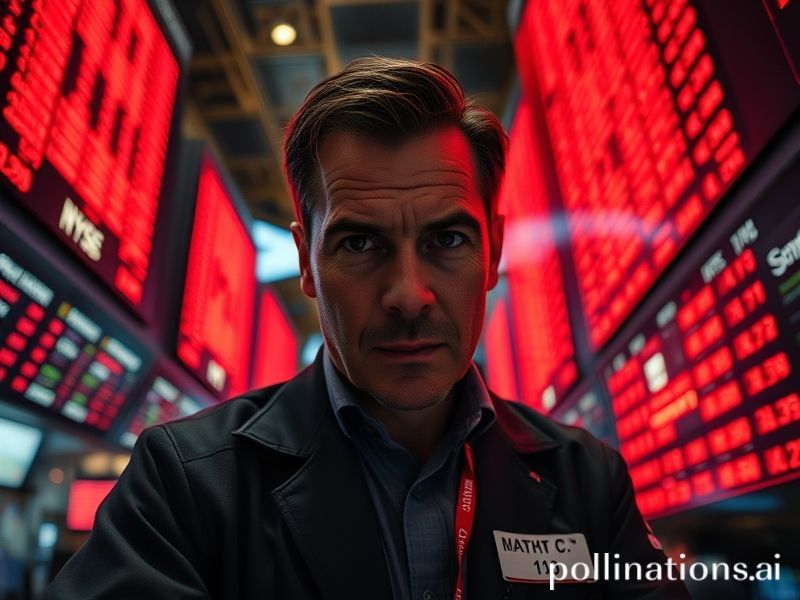Global Markets Throw a Panic Party: From Parisian Spreadsheets to Tokyo Mood Swings
Tokyo traders were still rubbing the sleep from their eyes when Frankfurt decided Tuesday was the perfect morning to panic-sell European banks, thereby gifting Wall Street a pre-dawn anxiety attack that ricocheted through Mumbai before Sydney had even finished its flat white.
Welcome to the planetary pinball machine we politely call the global stock market: a 24-hour masochism parade where a sneeze in Zurich becomes a pulmonary embolism in São Paulo, and no one gets to call in sick.
This week’s episode began, as most international crises now do, with a spreadsheet jockey in a Canary Wharf cubicle who noticed that one obscure French lender—let’s call it Crédit Fromage—had slightly more exposure to U.S. office towers than previously confessed. By the time he hit “send” on the internal memo, algorithmic traders in Chicago had already dumped half a continent of shares, triggering circuit breakers that sound like polite coughs but feel like guillotines.
Cue the dominoes. Seoul’s Kospi slipped 2.3 % because apparently Korean chipmakers are emotionally entangled with Gallic mortgages. The MSCI Emerging Markets index caught a cold—nothing serious, just a mild fever of 1.8 %—while the S&P 500 Futures performed their nightly ritual of pre-emptive self-flagellation. Meanwhile the Nikkei rose, because Japan remains the planet’s designated contrarian teenager: when everyone zigs, Tokyo zags, then posts a cryptic haiku about it.
Central banks, those kindly firemen who keep gasoline in their hoses, rushed out statements of “monitoring the situation closely,” which is central-banker for “we have no earthly idea what’s happening, but here’s some soothing italics.” Christine Lagarde reminded markets that the ECB possesses “all necessary tools,” prompting traders to immediately price in three more tools she hasn’t invented yet. Over in Washington, Jerome Powell’s beard grew another millimetre—its own form of forward guidance—while China’s PBoC simply injected another 20 billion yuan and hoped nobody would translate the footnotes.
Of course, the real action was in currencies. The yen soared because terrified investors still believe Japan is the world’s mattress. The euro wobbled like a guilty soufflé, and the pound sterling performed its traditional impression of a currency that’s just remembered Brexit happened. Cryptocurrencies, those digital tulips we pretend are hedges, staged a synchronized face-plant, proving once again that Bitcoin is less “digital gold” than “digital mood ring.”
Broader significance? Simple: interconnectedness has become our collective hair shirt. A mortgage in Milwaukee can now vaporize a retirement fund in Milan because we’ve wired the planet’s financial nervous system to a single, twitchy algorithmic cortex that never sleeps. The upside is efficiency; the downside is that every local idiocy achieves global distribution in milliseconds. As one Singapore fund manager sighed between cigarettes, “Diversification used to mean different countries; now it just means different time zones.”
And the humans? They’re still here, clinging to the cockpit like reluctant test pilots. Fund managers who once bragged about “boots-on-the-ground research” now refresh Twitter like medieval monks flagellating themselves with push notifications. Retail investors—our beloved amateurs—swap tips on Reddit forums that read like FinTok fan fiction: “If the VIX hits 30, I’m selling my kidney for puts.” The professionals, meanwhile, speak in soothing euphemisms: “volatility event,” “repricing of risk,” “technical correction.” Translation: the market just remembered it’s terrified, and fear, like perfume, always travels first-class.
So what happens next? Nothing, and then everything. Bargain hunters will wade in humming “buy the dip,” central banks will stage more fire drills, and somewhere a 26-year-old quant in Zug will tweak a model that unleashes tomorrow’s meltdown. The rest of us will check our phones at 3 a.m., quietly calculating how many years of retirement vanished while we slept—years we probably weren’t going to enjoy anyway, given the climate.
In the end, the market does what it always does: teaches humility at scale, charges tuition in sleepless nights, and reminds us that the only thing truly diversified is the list of things that can still go wrong.







